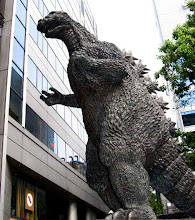
The Government of Chile is pursing a legal action against 4 US banks for hiding information relating to Augusto Pinochets accounts. If this legal action is succesful, this would be a landmark case for jurisdictional issues relating to banking operations. Specifically, all bank accounts relating to Chilean citizens can be legally requested to banking institutions worldwide. The legal action included Riggs Bank which was the first bank that leaked information on Augusto Pinochets accounts. I do not know why I see that this would Chavez case in 10 years. Lets remember the initial investigation...
In 2004, a United States Senate money laundering investigation led by Sen. Carl Levin (D-MI) and Norm Coleman (R-MN) — ordered in the wake of the September 11, 2001 attacks — uncovered a network of over 125 securities and bank accounts at Riggs Bank and other U.S. financial institutions used by Pinochet and his associates for twenty-five years to secretly move millions of dollars.[44] Though the subcommittee was charged only with investigating compliance of financial institutions under the USA PATRIOT Act, and not the Pinochet regime, Sen. Coleman noted:
“ This is a sad, sordid tale of money laundering involving Pinochet accounts at multiple financial institutions using alias names, offshore accounts, and close associates. As a former General and President of Chile, Pinochet was a well-known human rights violator and violent dictator.[44] ”
Over several months in 2005, Chilean judge Sergio Muñoz indicted Augusto Pinochet's wife, Lucia Hiriart; four of his children --Marco Antonio, Jacqueline, Veronica and Lucia Pinochet; as well as his personal secretary, Monica Ananias, and former aide Oscar Aitken on tax evasion and falsification charges stemming from the Riggs Bank investigation. In January 2006, daughter Lucia Pinochet was detained at Washington DC-Dulles airport and subsequently deported while attempting to evade the tax charges in Chile. In January 2007, the Santiago Court of Appeals revoked most of the indictment from Judge Carlos Cerda against the Pinochet family. But Pinochet's five children, his wife Lucia Hiriart, and 17 other persons (including two generals, one of his ex-lawyer and his ex-secretary) were arrested in October 2007 on charges of embezzlement and use of false passports. They are accused of having illegally transferred $27m (£13.2m) to foreign bank accounts during Pinochet's rule.
In September 2005, a joint-investigation by The Guardian and La Tercera revealed that the British arms firms BAE Systems had been identified as paying more than £1m to Pinochet, through a front company in the British Virgin Islands, which BAE has used to channel commission on arms deals. The payments began in 1997 and lasted until 2004.
Furthermore, in 2007, fifteen years of investigation led to the conclusion that the 1992 assassination of DINA Colonel Gerardo Huber was most probably related to various illegal arms traffic carried out, after Pinochet's resignation from power, by military circles very close to himself. [10]. Huber had been assassinated a short time before he was due to testify in the case concerning the 1991 illegal export of weapons to Croatian paramilitaries. The deal involved 370 tons of weapons, sold to Croatia by Chile on 7 December 1991, when the former country was under a United Nations' embargo because of the war against Serbia. In January 1992, the judge Hernán Correa de la Cerda wanted to hear Gerardo Huber in this case, but the latter may have been silenced to avoid implicating Pinochet in this new case ] — although the latter was not anymore President, he remained at the time Commander-in-Chief of the Army. Pinochet was at the center of this illegal arms trade, receiving money through various offshores and front companies, including the Banco Coutts International in Miami




No comments:
Post a Comment